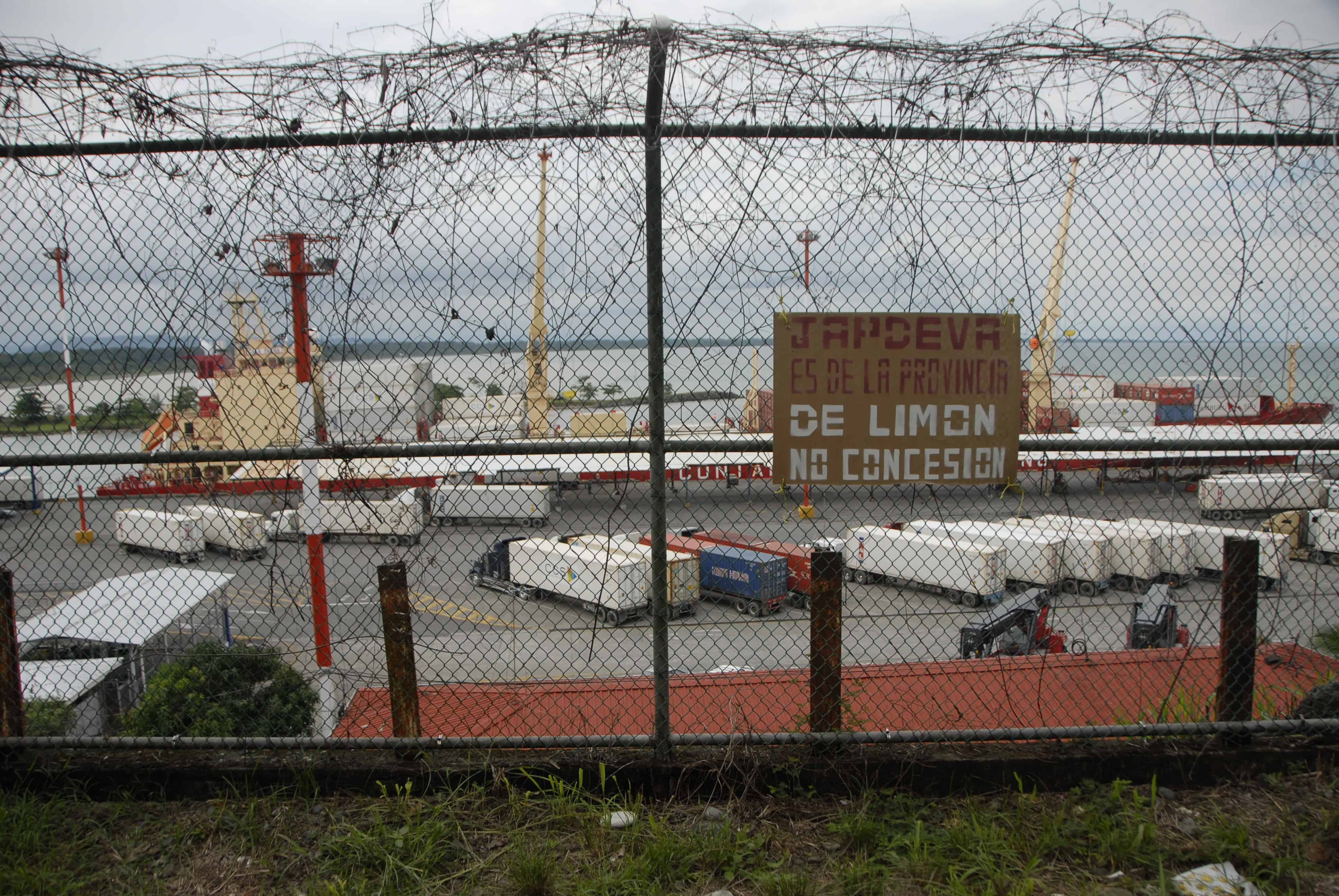Update Wednesday, Oct. 22, 12:10 p.m.:
Traffic at the Atlantic Port Authority’s (JAPDEVA) docks ground to a halt as the public agency’s union, SINTRAJAP, made good on its threat to strike over the terms of a $1 billion dollar port concession to Dutch company APM Terminals.
SINTRAJAP leader Ronaldo Blear announced that the docks in Limón and Moín would be closed starting at 8:30 a.m. on Wednesday, according to Costa Rica’s Radio ADN.
The union said the strike was a “fight for dignity, to stop a monopoly and avoid serious harm to the people of Limón,” according to a statement.
“We want modern ports without monopolies and [with] fair competition,” it continued.
Israel Oconitrillo, a spokesman for JAPDEVA, confirmed to the daily La Nación that the ports were closed.
Pablo Díaz, general manager of JAPDEVA, told La Nación that when the strike began there was a ship docked in Moín that needed another hour to unload its cargo. The manager said that handling of cargo at two more container ships at the Limón port was also interrupted by the strike Wednesday morning.
President Luis Guillermo Solís said Tuesday that a strike by the union was unjustified and he urged union workers to go back to work.
Apelamos a la legalidad de los contratos firmados por el Estado Costarricense, esta discusión es jurídica. Hacer cumplir la ley.
— Luis Guillermo Solís (@luisguillermosr) October 22, 2014
“We support the legality of the contracts signed by the Costa Rican state, this is a legal discussion. The law must be followed,” Solís tweeted during a visit to the Reventazón hydroelectric project near the Caribbean slope town of Siquirres.
The president said during a press conference Tuesday that National Police would be at the docks to maintain order if protests became violent.
Original post continues here:
Costa Rica’s proposed $1 billion Moín port expansion is facing another potential setback as the Atlantic Port Authority’s (JAPDEVA) union (SINTRAJAP) threatens a strike in Limón in coming days. SINTRAJAP leaders and some lawmakers believe a provision of the concession grants AMP Terminals a monopoly on handling containers, and therefore threatens stevedores’ jobs.
SINTRAJAP leaders announced the strike on Monday, but gave no firm date for when it would take place in Limón.
President Luis Guillermo Solís denounced the threat during a press conference on Tuesday, saying a strike was unjustified and Costa Rica would honor the terms of the contract signed in 2011.
“A strike in Limón is not justified; it only hurts the interests of many Limón residents,” Solís said. “We’re not going to allow a small group of people who have made statements that appear contrary to the Costa Rican spirit of conciliation and peaceful understanding to jeopardize an entire population who needs real job opportunities, not threats,” he added at Casa Presidencial.
The union’s threat to strike is not in vain. A SINTRAJAP strike in 2013 forced a cruise ship bearing 2,000 tourists to pass by Limón, costing the province an estimated $8,000 in lost tax revenue.
“The decision of this government continues to be to respect the legality of the contract, as it has been upheld by judges,” Solís added. The 33-year contract gives APM Terminals permission to construct and operate a new port called the Moín Container Terminal on Costa Rica’s northern Caribbean coast.
The Union of Private-Sector Chambers and Associations, an organization that represents over 40 national businesses, condemned the threat of a strike in a statement on Tuesday.
Costa Rica has some of the worst port infrastructure in Latin America, according to data from the World Bank. Officials and business leaders have framed the project as essential to revitalizing the Limón port and creating desperately needed jobs in the poorest province in Costa Rica.
A statement from the Public Works and Transport Ministry late Tuesday afternoon said the new terminal would quadruple the amount of traffic the port could handle.
Conflict over the port expansion has simmered for years. Recently, debate over a clause that would give a monopoly to APM for the loading and unloading of containers sparked the latest confrontation between the government and SINTRAJAP. Jorge Mora, technical secretary for the National Concessions Council, said in a statement that the contract gives APM the right to handle containers only, not small and mixed cargo, which currently makes up 40 percent of JAPDEVA’s workload.
Unions have fought the concession since it was first signed. In 2012, a San José administrative court upheld the contract, signed by President Laura Chinchilla (2010-2014) in 2011.
Objections from unions aside, the Moín project is also awaiting environmental approval from the National Technical Secretariat of the Environmental Ministry.






